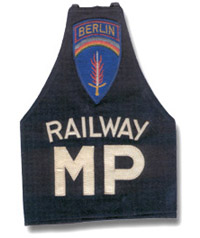| If you do
NOT see the Table of Contents frame to the left of this page, then
Click here to open 'USArmyGermany' frameset |
|||||||||||||||||||||||||||
570th Military Police Company (Railway Guard) |
|||||||||||||||||||||||||||
|
|
|||||||||||||||||||||||||||
|
|||||||||||||||||||||||||||
|
|
|||||||||||||||||||||||||||
| 570th Military Police Company History | |||||||||||||||||||||||||||
| 1945 - 1966 & 1990 - 1995 | |||||||||||||||||||||||||||
| (Source: Statement of Service, 570th Military Police Company; submitted by James C. Turcotte, a former member of the 540th MP Bn and 570th MP Company) | |||||||||||||||||||||||||||
|
|||||||||||||||||||||||||||
| 1958 | |||||||||||||||||||||||||||
| (Source: The Military Police Journal, July 1958; submitted by James C. Turcotte, Chelmsford, MA.) | |||||||||||||||||||||||||||
| MP Railroaders
in Germany The origin of railway security dates back to World War II. The need for the security of supplies being shipped by rail arose soon after the first invasion by Allied troops in the Mediterranean Theater. As the supply lines of the Allied Forces were extended, more and more personnel were assigned to railway security duties to guard the supplies so essential to the men on the front lines. As the war progressed through Italy, northern and southern France and continued into Germany, the need for railway security grew steadily as the quantity of supplies pilfered mounted in proportion to the increased needs of the fighting troops. A central railway security organization officially made its first appearance in 1945. General Headquarters. Military Railway Service, with station in Paris, France was the controlling body of two sub-headquarters knows respectively as: First Military Railway Railway Service, Strasbourg; and Second Military Railway Service, Brussels, Belgium, the latter transferring to Frankfurt am Main, Germany at a later date. Each of the sub-headquarters controlled in turn what was at the time known as a Railway Security Section. Both sections were officially activated on March 19, 1945. Plans for the inactivation of the Military Railway Service at the close of 1945 caused the transfer and assignment of responsibility for railway security to the direct control of the Office, Theater Provost Marshal, United States Forces European Theater and the subsequent activation of the 6869th Military Police Headquarters Detachment on January 1, 1946, which served concurrently at the Railway Security Division. This Division was charged with the guarding and protection of all U.S. mail and supplies in transit within the European Theater. The assigned objectives were the strategic placement of four Military Police Service Battalions (383rd, 385th, 390th. and 397th) and four Antiaircraft Artillery Battalions (115th, 379th, 537th, 547th) within the European theater to conform to the logistical situation and to control the most vulnerable points in regard to rail traffic; the posting of guards on all mail and U. S. supply trains in sufficient number to insure adequate protection and to prevent pilferage; and lastly, the posting of guard personnel in railway yards to protect supplies being marshalled or remarshalled for subsequent movement to destination. In January 1946 alone the amount of supplies known to be pilfered was $160,000. Effective January 1, 1946 the Railway Security Division was charged with the responsibility of organizing, training and equipping the German Railway Police. The forming of this police force and the indoctrination of the members was slow and laborious accomplishment. Recruitment was slow entering the force, individual Military Government screening had to be undertaken. At this time the mission of the German Railway Police was to maintain law and order in passenger stations and to protect all railroad property in railway yards. The 379th, 537th and the 547th Antiaircraft Artillery Battalions were inactivated in May and June of 1946 and replaced by the 381st and 388th Military Police Service Battalions. On June 1, 1946, the First Military Police Service Group with Headquarters in Frankfurt/Main was activated. The importance of a centrally controlled railway security activity in the Occupational Zones of Germany was evident. The collective evaluation of statistics and dissemination of information and general instructions by a central headquarters succeeded in the creation of a single and uniform operational procedure throughout the zone. Many problems, which had a zone-wide aspect would have remained largely unsolved if they had been handled by numerous separate commands. Military Police were better able to cope with difficult situations, as they were acquainted with the solutions attained in similar situations in other areas. Local suggestions designed to improve over-all efficiency and submitted to the central headquarters were promulgated to the operational benefit of the entire group. At this time the organization of railway security had an authorized strength of approximately 220 officers and 6,000 enlisted men, and subordinate organizations were stationed throughout the European Theater. The policy of reducing the number of military units and strength of "occupation" personnel necessitated plans for an early increase in the authorized strength of the German Railway Police with the ultimate aim of turning over more and more responsibility to them, depending upon the extent and standard of their capabilities and accomplishments regarding the security of U.S. shipments. A strength of 2,100 members for the German Railway Police was authorized in July, 1946. The closing out of the French, Belgian and Netherlands ports and the elimination of all other non-essential depot installations within the liberated countries resulted in a major increase in the movement of rail traffic and placed a heavy burden on railway security organizations during the summer months of 1946. In September 1946, the responsibility for railway security in France and Belgium was transferred to the Provost Marshal, Western Base Section, Paris which change resulted in the withdrawal of the 383rd and 390th Military Police Service Battalions and of the 115th AAA Bn. In August 1947, the 397th Military Police Service Battalion was inactivated. Considerable improvement in joint operations with the German Railway Police was accomplished during the first months of 1948. The anticipation of losing the operational control of the German Railway Police required the release of additional responsibility to that organization in order that experience could be gained prior to actual turnover to the German Railways. These additional duties included the responsibility of checking all freight shipments, keeping records and making out reports and escorting shipments of longer duration in the company of U.S. Military Police personnel. Through field experience it was found necessary to increase the German Railway Police to 6,500 men. The actual transfer of operational control of the German Railway Police took place on April 1, 1948 and caused the German Railway Administration to be charged with the responsibility for the safe transit of all U. S. supplies moving by train within occupied Germany. All priority and highly classified shipments were excluded from their responsibility and continued to be guarded by U. S. Military Police. In June 1948, the First Military Police Service Group was inactivated and the mission formerly assigned to that organization was assumed by the 7747th Military Police Railway Security Detachment, which title was shortly redesignated to 7747th Military Police Service Group. Then the 381st Military Police Service Battalion was inactivated and its area of responsibility within Germany was assumed jointly by the two remaining battalions, namely the 385th and the 388th MP Service Battalions. These two battalions were reduced to zero strength effective September 1, 1948 on which date the railway security organization was again redesignated as the 7747th Military Police Railway Security Group and reorganized as a TD unit with a new authorized strength of 42 officers and 495 enlisted men. Group headquarters remained in the same location in Frankfurt/Main with the group being divided into two sections known as Zones I and II with their headquarters located in Nürnberg (U.S. Zone) and Göttingen (British Zone) respectively. These two zonal operational contact points were set up to coordinate all operational and investigative activities. In turn the areas supervised by these zonal operational contact points were divided into operational areas known as railway security detachments lettering "A" through "G", which were further divided into eighteen active railway security detachments. The areas covered were identical to those previously controlled be the battalion organization. At this time the organization was charged with the responsibility of providin personnel for guarding U. S. mail, classified freight shipments and shipments of U.S. and U.S.-sponsored supplies through the Soviet Corridor from Western Germany to the divided city of Berlin. The organization was further charged with the investigation of intransit pilferages and the observation of the German Railway Police in the railroad yards and their duty performance in the protection of all other U. S. supplies. Due to the rapid progress of the German Federal Republic toward political sovereignty and the anticipation of the gradual phase-down of railway security and the consequential reduction in personnel in accordance with the volume of work, the two zonal operational contact points were discontinued and all operational and investigative matters henceforth handled directly from group headquarters in Frankfurt. Following the end of the Berlin Blockade on May 12, 1949, which lasted almost a year and in which the Soviet authorities imposed a series of restrictions and interferences on transportation between Berlin and the Western Zone, a temporary increase in personnel strength of the organization was necessary in order to handle rail traffic from and to Berlin and the added responsibility of providing personnel to escort Berlin passenger trains. With the final resumption of Berlin traffic in June 1949, a newly acquired responsibility was put into practice by the railway security organization; that of escorting trains classified in a VIP category between Berlin and Western Zones. In September 1949, the organization assumed still another responsibility for patrolling military duty trains and passenger trains for "HICOG" trains enroute to Bonn, the capital of the Federal Republic, for the purpose of transporting personnel connected with the Allied High Commission and the German Federal Government MP railroaders even "went to the air'' in December 1949 for a three-month period, when the unit was charged with the temporary duty of escorting classified air shipments to Berlin from Western Germany via Rhein Main Air Base. During the year of 1950 a total of 15,550 trains were guarded by railway security personnel and over 3.5 million miles were ridden by patrols and guards in the performance of their duties. Among the many special and classified freight shipments guarded by the organization were such significant shipments as the guarding of the "Freedom Bell", a symbol of freedom and democracy of the people of Berlin, and the guarding of shipments with high monetary value, sometimes exceeding one million dollars in value. The USAREUR Provost Marshal Division Courier System operated by the organization provided an expeditious means of transmitting important communications, reports and other materials between provost marshals throughout Germany and some cities in France. Railway security personnel played a major role in the August 24, 1951 train wreck at Remilly, France which claimed the lives of 22 persons and injured 40 others. Two MP mail guards on duty on that train, miraculously unhurt, performed commendable services in securing the scattered mail, warning other traffic, organizing rescue parties, summoning medical and police aid, and rendering first aid and assistance to injured passengers. The 7747th Military Police Railway Security Group was discontinued effective September 1951. Personnel and equipment were transferred to the 540th Militarv Police Service Company, which was reorganized the same date and redesignated as the 540th Military Police Railway Guard Battalion. The functions and responsibilities of the 7747th Military Police Railway Security Group were assumed by the redesignated organization. It consisted of a headquarters and headquarters detachment and three companies with an authorized strength of 22 officers and 296 enlisted men. In May 1952, a German Labor Service Company was organized to assist the 540th Military Police Railway Guard Battalion in guarding special shipmenta of U.S. supplies in transit within Western Germany. Organizing and training of the German auxiliary work force became another duty of the railway security unit. The responsibility of patrolling certain designated German civilian passenger trains throughout Western Germany was assigned the railway guard battalion in July 1951, as the majority of U.S. Military trains, which heretofore operated for the exclusive use of Allied personnel were discontinued and replaced by German passenger trains. In November 1952, the organization was assigned the task of guarding military troop and dependent trains originating in the Bremerhaven Port of Embarkation with destinations in the Western Zones of Germany and Berlin. Throughout the years the organization was commended repeatedly by armed forces and civilian authorities for the courteous and proficient performance of duty by military police on passenger, troop and dependant trains. Classified freight shipments were extended to destinations in France and Italy. Although no changes were made in the functions and responsibilities of the organization during 1953 and 1954, officers and men of the unit were in no way unoccupied. Regular and special commitments kept MP Railroaders busy around the clock. Constantly on the alert to fight pilferers, maintain law and order on trains and assure the safe traffic of personnel and supplies through the Soviet Corridor to Berlin, the organization added another six million guarded and patrolled miles to its outstanding record during these two years. Constant readjustments in the operational commitments, rescheduling of assigned mail, passenger and duty trains, stations and train surveys were made in an effort to continue to improve the operating efficiency of the organization. When the U.S. European Command, as part of the North Atlantic Treaty Organization, shifted its headquarters from Frankfurt, Germany to Camp des Loges, France in May 1954, MP Railroaders were called upon to assist in the transfer of personnel and supplies. In 1955, with the beginning of "Operation Gyroscope", the organization was again ready to fulfill its added responsibility, marked by the sharp increase of troop, dependent trains, and classified freight shipments. On March 15, 1956, the railway security organization was again reorganized and redesignated as the 570th Military Police Company (Railway Guard). The mission and function of the organization remained unchanged. A headquarters and six lettered detachments and the German Labor Service, which was also reduced in size, continued to guard and patrol the rails throughout Germany and the NATO countries out of strategically placed locations. During the years of 1955 and 1956, a total of 24,900 trains and shipments were patrolled and guarded and distances covered amounted to over 4.5 million miles. The organization was reorganized to its present structure as the 570th Military Police Company (Railway Guard) on June 5, 1957 as a TOE unit with a further reduction in personnel from 12 officers and 180 enlisted to six officers and 100 enlisted men. Personnel of the outlying detachments had to be withdrawn and were consolidated in the Frankfurt area. The organization now has a headquarters and a reinforced detachment at Frankfurt and two liaison detachments, in Kaiserslautern and in Bremerhaven. The unit's Berlin detachment remained and is charged mainly with the security of Allied rail traffic in the Berlin Corridor. |
|||||||||||||||||||||||||||
| (Source: NEW YORK TIMES, 24 November 1958; submitted by James C. Turcotte, Chelmsford, MA.) | |||||||||||||||||||||||||||
| Russians Delay
U.S. Train in Germany for 15 Hours By Sydney Gruson Special to New York Times Bonn, Germany, Nov 23 - Soviet military authorities detained the United States Army's West Berlin-Frankfurt train for almost fifteen hours today on the border between West and East Germany. The train and the eighty Americans aboard were allowed to proceed only after a 20-year-old East German was taken from the train and turned over to Soviet officials. The German youth had apparently gotten aboard the train during the night. The train, with eleven children among the Americans on board, was one of four that the Army runs daily between West Berlin and Frankfurt and Bremen. It pulled into the Soviet railway checkpoint at Marienborn, six miles from Helmstedt on the West German side of the border, at 10:45 o'clock last night. The Soviet officials at the checkpoint told the American train commander, who was one of a crew of six among the eighty Americans aboard, that they had information that an East German had broken into the train. Although the Army announcement of the incident did not say so, the Russians were reported to have demanded the right to search the train. The train commander, one announcement said, "acting on standing instructions, refused to let anyone board or leave the train at Marienborn." Col Ernst Von Pawel of Kansas City, Mo., chief of the United States Army's liaison mission to the Soviet forces in East Germany, was ordered to Marienborn from Potsdam to investigate. The Army announced that Colonel Von Pawel "found that a 20-year-old East German male was aboard." "This unauthorized passenger had broken into the train at Gerwisch," the Army said, "and his presence was revealed to the Soviets after their extensive interrogation at Marienborn of an East German conductor on the duty train." The train had stopped at Gerwisch, a small siding in East Germany about seventy miles from West Berlin presumably to make way for East German rail traffic. The train was released at 1:10 P.M. (?) today, the Army said, "after Colonel Von Pawel turned the unauthorized passenger over to the Soviets." When the train pulled into Helmstedt, the military policemen were guarding the doors of all six cars. The window on one of the doors, which are locked from the inside, was broken. There was food aboard the train, but no dining car. The passengers, Army and Air Force personnel and dependents and civilian employees of the United States Government in West Berlin and West Germany, were given hot drinks and refreshments at Helmstedt. Plant by Reds Suspected On the 118-mile journey through Communist East Germany between West Berlin and West Germany, the military trains were pulled by East German locomotives with East German crews. The locomotive was detached at one point during the delay at Marienborn, leaving the train without heat. It was returned later, presumably after complaints were made to the Soviet officials at the checkpoint. The army offered no explanation for the East German's presence on the train except that he "broke in." One American official, who had access to the reports of the incident, said it looked like "a plant" to him. Such a plant, the official added, could serve to create trouble for Western Allies and remind them how much they are at the mercy of the Communists on the land routes between West Berlin and West Germany. But Army officers would say only that a "plant" was a "possibility." [News agency reports from Berlin said East German authorities there identified the train stowaway as Siegfried Pump, wanted on a burglary charge. The Associated Press said United States Army officials in Berlin were checking on a possible Communist plan.] |
|||||||||||||||||||||||||||
| COMMENTS: A fictional movie was actually made based on this incident. The movie,
released in 1964, was titled "Verspätung in Marienborn"
(English title: "Stop Train 349"). The incident is
also mentioned in Henrik Bering's "Outpost Berlin,"
a book on the history of the American military forces in Berlin, 1945-1994. The MPs involved in the incident were from the Berlin detachment of the 570th MP Co. CORRECTION (Source: Email from Arnold Lundquist) The story cited about Duty Train held in Marianborn cites an article from NY Times from Nov 24, 1958. The story is accurate except the date was Nov 24, 1961 not 1958. I know, I was on that train and remember it well. I am sure it is a clerical error but should be corrected . |
|||||||||||||||||||||||||||
| 570th Military Police Platoon History | |||||||||||||||||||||||||||
|
|||||||||||||||||||||||||||
1970 |
|||||||||||||||||||||||||||
(Source: Email from John Burton, former commander of the 570th MP Pltn, 1970-1971) |
|||||||||||||||||||||||||||
Commanded the 570th Military Police Platoon in 1970-71. Might have couple old photos and a newspaper article. Previously I was in HHD and Co. B (Giessen) 709th MP Bn. Headquarters 709th was in Offenbach at the time with units were in Offenbach, Giessen, Hanau, and Kassel. 570th was at Gutleut Kaserne during that time. I pretty much grew up in Germany as a dependent. My father was stationed there 6 years 56-60, 61-64. I even went to high school 2 years in Frankfurt. ADDITIONAL INFORMATION The 570th MP Plt. (Railway) was located on Gutleut about where Buidlfing #1162 is on the installation map. We had part of the 2nd and 3rd floors. An MI unit had the bottom portion be we never saw them (their door was blocked off from our stairwell). We didn't have a motor pool or mess hall since we only had 37 men! (I don't recall who our men messed with but think it might have been the 21st Replacement.) To be honest, it was rare for us to have more than 3-5 men around at any one time! The 709th was our admin support and we "borrowed" vehicles from them if needed. Operationally, we were under the Provost Marshall General which the 709th Bn. Commander didn't really like (I was the S-1/Adjutant before going to 570th). I only have one photo which is really of me with some of our German partnership unit men. Probably not helpful but I attached it. MAJ Zollekofen is holding the pointer and talking to me. The other German officers I can't identify right now. The American officers behind the motorcycle I can probably find out. One with glasses was in 709th at one time but believe he was in Frankfurt PM office at that time. The LTC with him I believe was the PM in Frankfurt at the time but I didn't know him. We did firearms qualification with the German's and let them qualify on our new (to them and us) M-16 rifles. Also got to shoot their other weapons as well - always fun to shoot! Attached is a bad copy of newspaper article from the Stars & Stripes on the 570th. I have a large clear hard copy they sent me but it is too large to scan as one document. This article may have more interest for you. I've also attached copy of railway pass that members of the 570th used to travel on trains and access train stations or other railway facilities. Thought it might be of interest. Also photo of MP Railway brassard that I kept. Early in my time at 570th I took a train security mission with some of the men so I would know what they did. If I recall it was took about 10 days from Germany to Pizza, Italy and back. Interesting trip, long hours and a lot of time sitting in freight yards! Not to mention watching other train cars pilfered, eating in railway yard workers canteen (as invited guest) and sitting just inside Swiss border for a couple of days - we were not allowed on ground in Switzerland and had to cover all US markings on our guard car. Some day I have to write the story up! As side note, we had a lot of married men lower ranking enlisted men. With all the TDY they liked it because it helped pay for living on economy. We recruited heavily from the 21st Replacement for individuals with language skills - MPs or not. Our people got a lot of responsibility and a lot of travel around Europe. Sorry I don't have more for you. I thought I had more but either can't find it or my memory is gone (maybe a bit of both). |
|||||||||||||||||||||||||||
|
|
|||||||||||||||||||||||||||
| Standard Operating Procedure, 15 November 1956 | |||||||||||||||||||||||||||
| (Source: Standing Operating Procedure (SOP), 570th Military Police Company, 15 November 1956; submitted by James C. Turcotte, a former member of the 540th MP Bn and 570th MP Company) | |||||||||||||||||||||||||||
|
|||||||||||||||||||||||||||
|
6.
Responsibilities:
a. The Provost Marshal, USAREUR, exercises administrative and operational control over this Company. b. This Company is responsible for providing MP Train Patrols and Guards on designated Passenger Trains, US Military Trains, Troop Trains, Dependent Trains, Classified Freight Trains, Special Freight Trains, US Mail Trains, VIP Trains, and Special Shipments. c. This Company will guard the shipment to Bremerhaven Port of Embarkation of privately owned vehicles of deceased personnel. d. This Company will investigae pilferage of official consignments incurred in transit. 7. Authorities: a. The authority of all Military Police personnel who are in the proper execution of their duties is derived through the chain of command from the President of the United States who is Commander-in-Chief of all US Armed Forces. b. Field Manual 19-5 entitled "Military Police" and the Manual for Courts Martial also provide authority for Military Police. c. The authority of Military Police of this Company derives more specifically from USAREUR Circular 190-45, 9 May 1956, which is entitled "Railway Security in Germany" and which pertains to the purpose, mission, responsibilities, and coordination of the 5709th Military Police Company (Railway Guard). d. USAREUR Circular 633-20, 6 July 1955, provides authority for apprehensions, searches, and seizures. 11. German Railway Police: Effective liaison will be established with the German Railway Police. In the interest of efficient law enforcement, the cooperation of German Railway Police in furnishing information will be encouraged. Train Patrols and Guards will be especially alert to cooperate with German Railway Police and to establish good relations with them at all times. 12. Labor Service Railway Guard Company: a. The 1952d Labor Service Railway Guard Company is assigned to this Company for operational control and furnishes operational support to this Company in performing its mission. b. Labor Service Train Guards will be utilized to guard United States supplies. c. Labor Service Train Guards will be utilized only when accompanied by one or more Military Police of this Company. d. Labor Service Train Guards will be used in the proportion of one to three Labor Service personnel for each MP depending upon the size and duration of a rail shipment. e. Labor Service personnel when guarding non-moving cars (such as a car sidetracked due to a hotbox) may perform this duty unaccompanied by US MPs, except for first class mail and except for the provisions of this SOP as contained in para 59 on Duties of Train Guards. f. The CQ or duty driver will post both military and Labor Service personnel. g. Labor Service personnel dispatched as Train Guards will be issued travel orders in lieu of Railway Security Passas. h. Officers of the 570th Military Police Company (Railway Guard) are authorized to authenticate Duty Travel Orders for Labor Service Guards. Travel orders will designate route of travel and period of temporary duty. Passenger Transportation Warrants for the return trip from duty destination will be obtained prior to departure on train patrol. i. Labor Service personnel are required to have railroad tickets when guarding a mail car attached to a passenger train and when riding to and from point of duty (deadheading). Railroad tickets are not required when guarding mail or freight shipments attached to freight trains. Labor Service personnel, when accompanied by MPs, may travel without a railroad ticket (deadheading) on troop trains on a space available basis. j. Labor Service personnel will not be used on shipments in the Berlin corridor or on shipments beyond the geographical boundaries of the Federal Republic of Germany (Western Germany). k. Combat type C-rations will be issued to Labor Service personnel going on train guard duty by the Duty NCO or CQ of the dispatching organization. Sufficient rations will be issued to cover the trip and the possibility of set-out cars and layovers should be taken into consideration. Unused rations will be returned to the Duty NCO or CQ upon completion of trip. l. Unit Commanders and NCOICs of the 570th Military Police Company (Railway Guard) will supervise the technical training of Labor Service personnel located in their respective areas. m. During layover periods Labor Service personnel will be quartered and messed at the nearest convenient Labor Service organization. 18. Transportation Corps Train Commanders: a. Each US military/passenger train (including Duty Trains, Troop Trains and Dependent Trains) is under the control of a Transportation Corps Officer or Enlisted Man designated by the Transportation Officer, USAREUR, as his representative. This person carries the title of Train Commander and has the duties, responsibilities, and authority of a railroad conductor. He maintains liaison with the Troop Commander, kitchen crew, and railway operating crew and advises the Train Patrol of any disorder. MPs will cooperate fully with the Train Commander, regardless of his rank, regarding the maintenance of law and order among US Forces personnel aboard the train, but will not consider themselves under the command of the train commander. If MPs are ordered to perform some non-military police duty they will advise the train commander as courteously as possible that their orders and instructions restrict them to performing only Military Police duties. Any differences with Train Commanders should be reported to the Troop Commander immediately, and reported on the Guard Trip Report. b. The Train Commander aboard the Berlin Duty Train is always an officer while the train is between Helmstedt and Berlin. His duties and responsibilities are greater than the usual Train Commander since they include relations with Soviet and East German officials in the Berlin Corridor. MPs on these trains are to assist the Train Commander in seeing that no unauthorized persons ride the train. This assistance may take the form of checking railroad tickets of passengers while embarking or when aboard the train. The commands and orders of the Berlin Duty Train Commanders will be obeyed. In the event of any difference, the action wiill be performed and a report made on the Guard Trip Report. |
|||||||||||||||||||||||||||
| If you have more
information on the history or organization of the 570th MP Company,
please contact me |
|||||||||||||||||||||||||||
|
|||||||||||||||||||||||||||

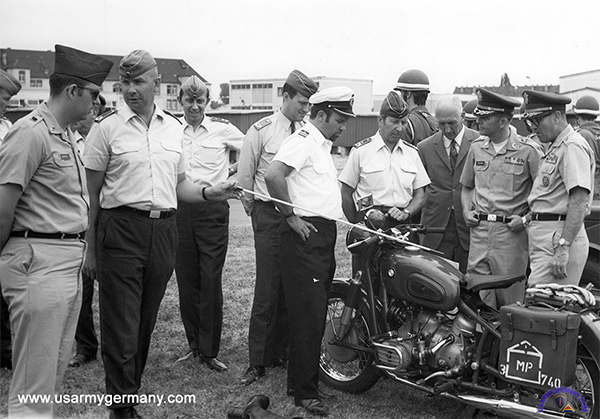
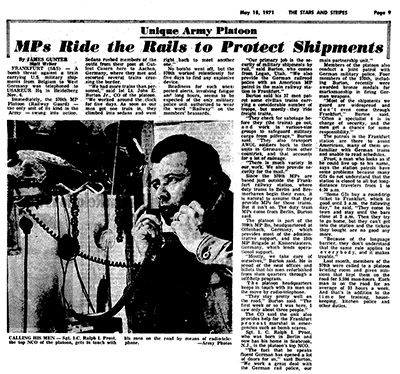
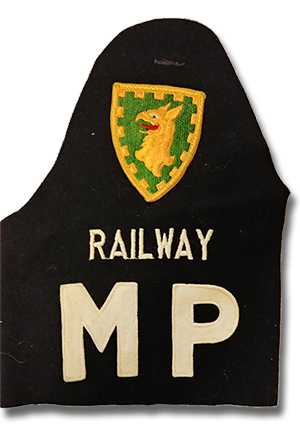
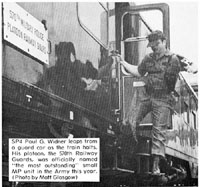
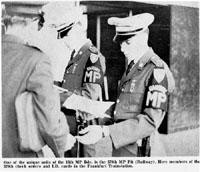
%20SOP%20cover.jpg)
